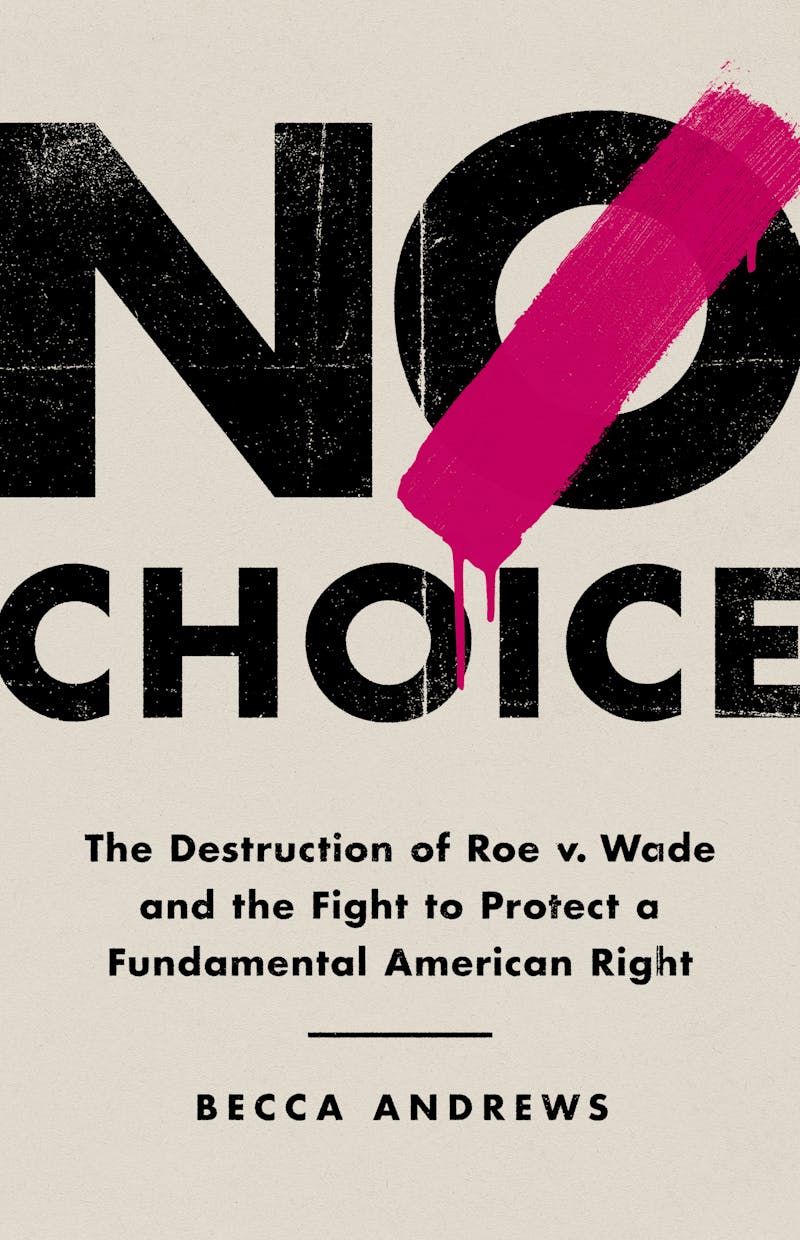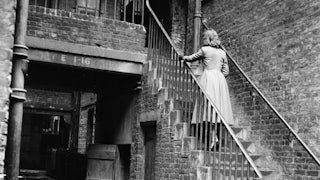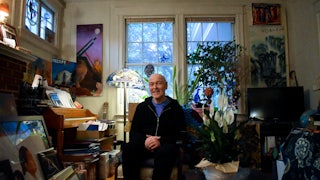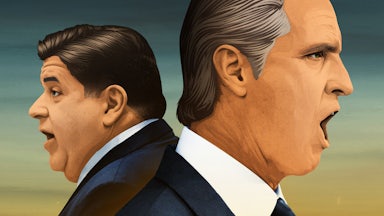In the unnatural light of the doctor’s office, Lucy, a student at Kent State, remembers a faint prickle of awareness that the gynecologist seemed uncomfortable, like he was talking around something. “Well ... you’re two months pregnant,” he eventually stammered. She stared at him, stunned. He got up and left the room. “Oh my gosh, what am I gonna do?” Lucy said. One of the nurses handed her a card with a phone number. “They will help you. They know who we are, and it’s safe.” No one ever said the word abortion. It was 1971.
When she called, the voice at the other end of the line told her they would take care of everything for a flat fee—transportation to and from the airport, plane tickets, a car to the clinic in Dobbs Ferry, New York, where abortion had been legalized, as well as her way home. A driver came and picked her up at her dormitory to take her to the airport, and she noticed another girl sitting inside the car. When she arrived in New York, a man was waiting at La Guardia Airport to shepherd her and several other women into three vans.
At the clinic, they were met by a woman with a perfunctory manner who handed out paperwork. They would go back and change out of their clothes when their names were called, they would have their abortions, rest awhile, and then they would get dressed, go home, and live out their lives.

Lucy didn’t know it, but the clinic in Dobbs Ferry belonged to a network of vetted facilities that was trusted by the Clergy Consultation Service on Abortion (CCS), a group of faith leaders who connected women who needed abortion care with capable providers in the years before Roe v. Wade, driven by their God-given commandment to help those in need. Though CCS began in New York City, their mission spread, and it wasn’t long before there were chapters scattered across the nation.
Rev. William Kirby, a leader in the Missouri chapter and then a chaplain at Stephens College, a private women’s school in Columbia, Missouri, described getting students from the campus to Dobbs Ferry. They were shuttled to the St. Louis airport, where they would catch an American Airlines flight to La Guardia, using a specific American Airlines flight because a nurse that worked with them had trained the flight attendants so that they knew what to do if a woman began to hemorrhage on her journey home.
CCS was radical, to be sure. It was also overwhelmingly made up of white men who were middle-aged and belonged to the upper middle class. The service’s beginnings are obscured in a tangle of memories compromised by time and ego, but CCS became an important funnel for women who sought safe abortion care, and it helped destigmatize abortion using a religious framework.
“Why was abortion such a priority?” That was the general sentiment of the ministers and rabbis who showed up at the invitation of Rev. Howard Moody’s for CCS’s first meeting at Judson Memorial Baptist Church in New York, which would operate as the service’s home base. “The reaction of this group of clergy to the abortion issue stemmed from a poor understanding and limited knowledge of the problem as well as a failure to realize that if they were to make themselves available to women experiencing this problem they would discover needs they never knew existed,” Moody and Arlene Carmen, a Judson administrator who helped run the operation, wrote in their book Abortion Counseling and Social Change. Judson Memorial was the perfect home for the service. Though it was technically a Baptist church, the congregation comprised a diverse set of religious backgrounds across denominations. Some, like Carmen, weren’t Christian at all. Outcasts were welcome at Judson Memorial.
The original consultation group was comprised of nineteen ministers and two rabbis—no Catholic priests were approached. They announced their presence on the front page of The New York Times in May 1967. Moody’s carefully crafted message emphasized the group’s moral responsibility, balancing women’s desperate need for medical care with fear of legal consequences or of winding up on the table of a con artist or predator. Though they had carefully talked through the risk they were taking, Moody and Carmen brushed off anyone who counseled caution, which could substantially delay their mission. They had been called by God. It was time for action.
Over time, members have cited a variety of Scripture to support their work. There’s Leviticus 19:16, which implores believers in Hebrew to “not stand idly by the blood of your neighbor.” James 1:27 instructs that pure religion is found in the care of widows and orphans, in serving their afflictions. “Unwanted, unintended pregnancy is an affliction,” Rev. Robert Hare said firmly.
The phone rang and rang, insistent and unceasing. People inquiring about abortion care would dial the number that appeared in the Times, which connected them to an answering machine at Judson Memorial. The message changed weekly. Clergy members served two at a time, minimum, rotating shifts to avoid burnout. In the beginning, the answering machine would explain how to contact the two clergy on call for an in-person appointment. Callers could choose their counselor based on that message, which provided broad information on the denomination and the borough of those who were available.
Carmen, a no-nonsense Jewish woman who often wore her hair swept up in a tight bun, was firmly at the center of the service. “I’m probably the only Jewish administrator of a Baptist church in the United States of America,” she told an interviewer in 1976. She didn’t officially start her position at Judson Memorial Church until November, about six months after the Clergy Consultation Service began operations, but she was offering organizational input from the beginning. She had met Howard Moody, whose military-style crew cut belied his politics, through the Village Independent Democrats in 1965, where she discovered a passion for social justice. Though she never had firsthand experience with abortion, it was her matter-of-fact voice that informed callers of the steps necessary to get a referral through the service.
She communicated with the physicians the service referred patients to, and she masqueraded as a patient to check out clinics. If the place initially passed muster, she would continue the charade, though often it did not get that far; many places were clearly unsafe and unsanitary. Feet in the stirrups, lying back on an exam table, Carmen would interrupt the doctor and tell them who she really was—not pregnant, actually—and explain the CCS’s mission, handing over a letter that described the organization in more detail. Even then, the responses of the patients were monitored and kept as the most important evaluation of providers.
Alongside Reverend Moody, Carmen set the parameters of the service, and she was clear about the consequences of violating those rules: she would not hesitate to kick a rogue clergyman out of the service. “Arlene was the enforcer,” Moody recalled in an interview. “And she was wonderful. She didn’t mind saying, ‘Those clergy are a bunch of shitheads! They don’t know from nothin’.’”
After a face-to-face discussion with the patient who was seeking care, clergy would make referrals when it was clear that the potential patient had her mind made up about what she needed, but clergy would never communicate directly with a doctor or clinic staff. Only Arlene would take care of those details, and she would do no counseling: there was a clear demarcation of duties, upon the advice of the attorney who volunteered for the CCS. “So there was no way in which a conspiracy among clergy, abortionist, and the woman client could be proven,” explains Arlene. Women had to be referred to out-of-state practitioners to complicate jurisdiction in case the law got involved.
Some of these precautions implemented by the service were too burdensome for those who needed help the most. In a New York magazine article from August 1969, journalist Susan Brownmiller describes a scene in which a woman calls Reverend Moody to ask about abortion care. The pastor, nervous that the line could be tapped by the government, tells her that she has reached Judson Memorial Church, where they do abortion counseling. His caution was born from experience: not long after the CCS launched, the service received a tip from a police department that officers had tapped the phone line at the church, though this was not the same line to answering machine. He begins to invite her to come in, but she’s not having it. “I don’t need a sermon on the mount, Reverend. I need an abortion,” she tells him, before hanging up.
Patients with limited resources were especially frustrated with the travel requirements. This likely contributed to the racial demographics of the patients who were helped by the CCS—the vast majority were white women. The group was, however, aware and concerned with the disparities in abortion care. In their initial mission statement, they wrote: “The present abortion law in New York is most oppressive of the poor and minority groups.” Still, in one sample of 6,455 patients who were helped by the New York CCS chapter, more than 80 percent were white.
In 1968, the service began to expand beyond New York, opening chapters in states across the country, from California to Massachusetts. The openness and expansion of the operation was the point. In The Wall Street Journal, Rev. Farley Wheelwright, who served in the Cleveland CCS, put it this way: “There is no abortion underground.... We’re helping to bring abortion above ground, to make it open, respectable, and eventually legal for any woman to end her pregnancy whenever she and her doctor feel it’s the best course.”
After a few years, Moody and Carmen decided it was time to expand their mission and open a clinic. They began plotting to do so in 1969, “to expose the hypocrisy of a law which allowed ‘therapeutic’ abortions for the rich but denied them to the poor.” So-called therapeutic abortions were legal; by definition, they were performed to preserve the life of the pregnant person. But it required two letters from different psychiatrists declaring that the patient was at serious risk of suicide, in addition to cementing approval from an internal committee at the hospital where the procedure would be performed. The CCS clinic planned to get around this by tracking down two psychiatrists who believed that any woman who was pregnant and did not wish to be a mother was in serious peril because she was considering an illegal abortion, which posed an inherent risk to her life.
The group was still trying to work through the details of their practice when, in April 1970, New York unexpectedly legalized abortion. The clinic opened the following July, when the new law went into effect, and it served 700 women in its first month, most of which were referred from CCS chapters in other states. It operated 16 hours a day, from 7 a.m. to 11 p.m., seven days a week. Counselors were able to adjust the rate of the procedure depending on the needs of the patient. More CCS chapters opened more clinics, not always legally, providing care directly to women, taking root in 38 states. They grew into the largest pre-Roe referral service. Gillian Frank, a historian of sexuality, gender, and religion estimates that the group helped at least a quarter of a million women. But when abortion was legalized nationally in 1973, the service disbanded, feeling that there was no longer any use for them.
Not long after, the Religious Right began to take shape, making abortion one of the pet political issues of the evangelical church and creating a dynamic that led Americans to equate people of faith with anti-abortion values.
From the book NO CHOICE by Becca Andrews. Copyright © 2022 by Becca Andrews. Reprinted by permission of Public Affairs, an imprint of Perseus Books, LLC, a subsidiary of Hachette Book Group, Inc. New York, NY. All rights reserved.






